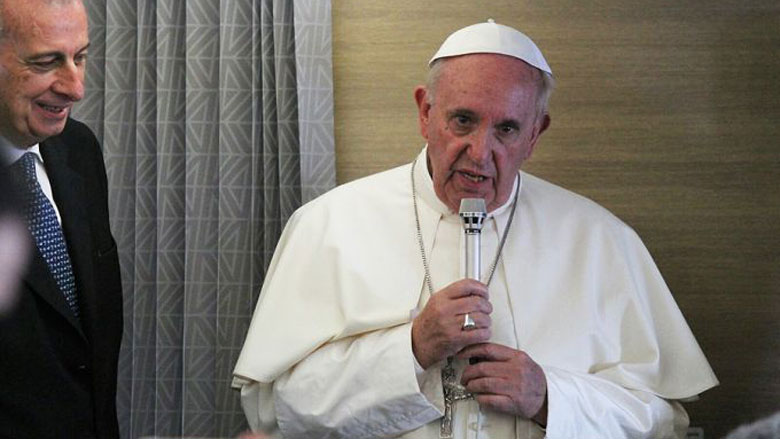Pope Francis: ‘Suffering for one’s religious belief has become a daily reality’
By CNS News | June 27, 2016, 10:28 EDT
 Pope Francis speaks to reporters aboard the papal flight from Africa to Italy, Nov. 30, 2015. Credit: Martha Calderon/CNA.
Pope Francis speaks to reporters aboard the papal flight from Africa to Italy, Nov. 30, 2015. Credit: Martha Calderon/CNA. (CNSNews.com) – Pope Francis joined an Armenian leader Sunday in lamenting the persecution of Christians and other minorities in the Middle East – and angered Turkey by once again referring to the atrocities committed against Armenian Christians a century ago as “genocide.”
The pontiff and Armenian Apostolic leader Karekin II in a joint statement spoke of the “immense tragedy” of “countless innocent people” being killed, displaced or exiled as a result of conflicts carried out on ethnic, religious, political or economic grounds
“As a result, religious and ethnic minorities have become the target of persecution and cruel treatment, to the point that suffering for one’s religious belief has become a daily reality,” they added.
The statement, issued at the end of Pope Francis’ three-day visit to Armenia, included an appeal to world leaders.
“We implore the leaders of nations to listen to the plea of millions of human beings who long for peace and justice in the world, who demand respect for their God-given rights, who have urgent need of bread, not guns,” it said.
The two Christian leaders also spoke out against violence being carried out on the basis of religion, clearly alluding to – although without directly mentioning – radical Islam.
“Sadly, we are witnessing a presentation of religion and religious values in a fundamentalist way, which is used to justify the spread of hatred, discrimination and violence,” they said. “The justification of such crimes on the basis of religious ideas is unacceptable.”
It was the reference to the century-old mass killings of some 1.5 million Armenians in Ottoman Turkey that drew the most attention during the papal visit, however.
Francis and Karekin commemorated the grim episode and, citing words used by Pope John Paul II during a visit to Armenia in 2001, said it was “generally referred to as the first genocide of the 20th century.”
Two days earlier, the pope shortly after arriving in Yerevan referred to the Ottoman atrocities first as the Metz Yeghern, the term used in Armenia, then by its English translation (“great evil,” although it is also sometimes rendered “great crime” or “great calamity”) and finally as a “genocide,” adding that it was “the first of a deplorable series of huge catastrophes of the past century.”
Turkey’s Islamist-leaning government is highly sensitive about the issue, and although the pope a year ago used the term “genocide” in this context, his repeat of the word on Armenian soil made once again waves in Ankara.
Turkish Deputy Prime Minister Nurettin Canikli told reporters Saturday Pope Francis’ words were “unfortunate.”
“The pope’s actions and his papacy still show traces of a crusader mentality,” he said. “His comments are biased and have no bearing on the truth.”
Canikli also said that the truth about “the so-called ‘genocide’ is known to everyone, even Armenians themselves.”
Despite his strong objections, the immediate Turkish reaction was milder than its response to the pope’s first public use of the term “genocide” – at St. Peter’s Basilica, marking the centenary in April 2015.
Then, Ankara summoned the Apostolic Nuncio for a formal protest, and recalled its ambassador from Rome, accusing the leader of the Rome Catholic Church of “discrimination against Muslims.”
It took longer than nine months for the diplomatic tensions to ease.
Pope Francis, flanked by Vatican spokesman Federico Lombardi, talks to journalists on board the airplane Sunday, on his way back from Armenia to the Vatican. (AP Photo/Tiziana Fabi/Pool)
‘No crusade’
Vatican spokesman Fr. Federico Lombardi said Sunday that the pope was advocating peace and dialogue, not war, and that his speeches reflected no “crusader spirit.”
Pope Francis himself also responded to the criticism, telling reporters on his flight back to Rome that as he had used the word “genocide” before, as had Pope John Paul II in years past, “it would have seemed very strange to not say it in Armenia,” the AP reported.
“I have never said it with an offensive spirit, but objectively,” he said.
Largely overshadowed by the media focus on the genocide remarks, Pope Francis and Karekin II also spoke in their statement in support of the traditional family and marriage.
“The secularization of large sectors of society, its alienation from the spiritual and divine, leads inevitably to a desacralized and materialistic vision of man and the human family,” they said.
“In this respect we are concerned about the crisis of the family in many countries,” the statement said. “The Armenian Apostolic Church and the Catholic Church share the same vision of the family, based on marriage, an act of freely given and faithful love between man and woman.”
Turkey rejects the notion that the mass killings a century ago were orchestrated and intentional. It argues that between 250,000 and 500,000 Armenians, along with a larger number of Muslims, died amid chaos and disease accompanying World War I and the collapse of the 600-year Ottoman Empire.
“Documents of the time list intercommunal violence, forced migration of all ethnic groups, disease, and, starvation as causes of death,” the Turkish foreign minister asserts. “Others died as a result of the same war-induced causes that ravaged all peoples during the period.”
Armenia is a landlocked nations slightly larger than Maryland, located between Turkey, Iran, Georgia and Azerbaijan. According to the CIA World Factbook it is home to some three million people, about 93 percent of whom are Armenian Apostolic. Millions more people of Armenian live abroad, including about one million in the United States.
— Written by Patrick Goodenough











